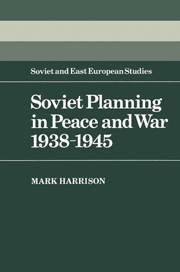Book contents
5 - SOVIET LESSONS FROM WORLD WAR II
Published online by Cambridge University Press: 29 October 2009
Summary
The present war has forcefully confirmed Lenin's well-known statement that war is an all-round test of a nation's material and spiritual forces. The history of wars teaches that only those states stood this test which proved stronger than their adversaries as regards the development and organization of their economy, as regards the experience, skill, and fighting spirit of their troops, and as regards the fortitude and unity of their people throughout the war.
Ours is just such a state. The Soviet state was never so stable and solid as now in the third year of the Patriotic War. The lessons of the war show that the Soviet system proved not only the best form of organizing the economic and cultural development of the country in the years of peaceful construction, but also the best form of mobilizing all the forces of the people for resistance to the enemy in time of war.
(I. V. Stalin, speaking on 6 November 1943)INTRODUCTION
The Soviet Union is an historically conscious society which returns systematically to its own past for lessons to help it understand present-day tasks. The lessons of history are drawn at many levels. Some of the learning takes place through reproduction of common sense and popular legends, in the same way as British political leaders might refer public opinion to the ‘lessons’ of appeasement, the ‘spirit of Dunkirk’ or the contribution of the labour movement to victory over Hitler. The learning process also operates through politically directed enquiry into the past, the expert analysis of records and so on.
In Soviet life there is a constant evocation of the lessons of World War II for both ideological and practical reasons.
- Type
- Chapter
- Information
- Soviet Planning in Peace and War, 1938–1945 , pp. 222 - 248Publisher: Cambridge University PressPrint publication year: 1985



